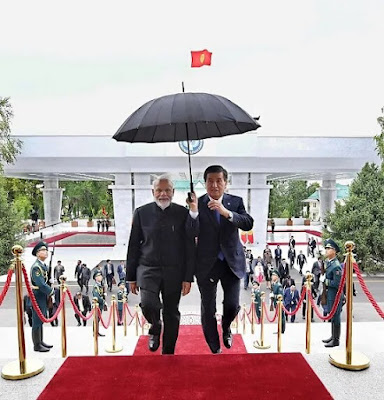India - Central Asia ties are set to soar with first virtual summit tomorrow
The first India-Central Asia Summit will take place in a virtual format on January 27. India is the only country to host such a Summit with Central Asia. It is a path-breaking initiative with potential to significantly enhance the vibrant partnership that India enjoys with the five Central Asian states.
The virtual format was adopted as Plan-B as it was no longer possible to host a face-to-face summit with the Presidents of Kazakhstan, Kyrgyz Republic, Tajikistan, Turkmenistan and Uzbekistan, who were to be the joint chief guests during the January 26 Republic Day celebrations. However, the rapid spread of the highly transmissible Omicron variant of the coronavirus proved to be a formidable obstacle in the realisation of this plan. The Indian government needs to be warmly complimented that it is going ahead with this initiative to organise a virtual Summit rather than jettison the idea.
India-Central Asia Relations
The salience of Central Asian countries has grown significantly, for India and the world, after the coercive seizure of power by the Taliban in Kabul on August 15 last year. It is a measure of the distrust that the whole world harbours that even after more than five months of the forcible capture of authority by the Taliban, not a single country has conferred diplomatic recognition on it. In addition to the demand for an inclusive government in Afghanistan and protection of human rights of minorities including the Tajiks, Uzbeks, Hazaras, Shias, Hindus, Sikhs, women and girls, the global community has been demanding that the Afghan territory should not be used for launching terror attacks against its neighbours and others farther away.
India and Central Asian states share similar concerns about the imperatives of peace and stability in Afghanistan. This was demonstrated by the presence of the Secretaries of the National Security Councils of all these countries, along with their counterparts from Russia and Iran, at the Delhi Regional Security Dialogue hosted by India on November 10. In addition, foreign ministers of all the five Central Asian states travelled to India to participate in the Third India-Central Asia Dialogue soon thereafter on 19-20 December, while sending their deputies to the OIC foreign ministers meeting organised by Pakistan the same day. These back-to-back deliberations in New Delhi have placed India strongly back at the centre-stage of negotiations on peace and stability in Afghanistan.


Comments
Post a Comment